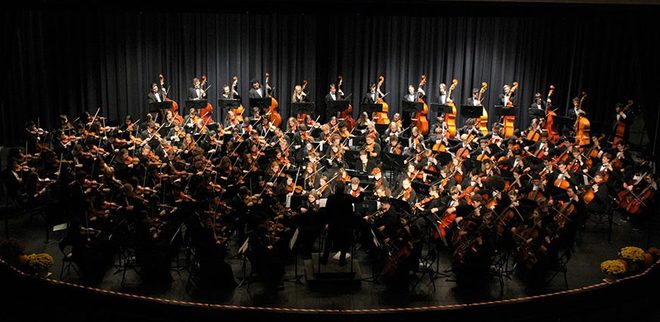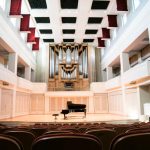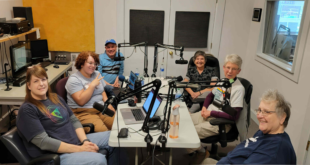Podcast: Play in new window | Download (Duration: 11:23 — 7.7MB)
For students who are homeschooled already or just students who have been taking private lessons regularly, they have also felt this disruption. These kids will not be able to have that contact with their teachers anymore and it may lead to loss of connection
or even a loss of playing music at all as some students will feel less motivated without that contact.
Private music teacher and professional performer, Dena El Safaar explained how students have been adapting and how she has been changing her own routine to accommodate the disruption of the virus.
El Saffar has worked out of her own home studio giving private lessons since the early 2000s. She teaches primarily 6-18-year-olds, as a violinist and violist herself.
El Saffar has been using Zoom since March. She said she was grateful for having previously taught a handful of commuting students through Skype and that she has experience with the online setting to use now. Many of her students reacted well to the shift in teaching online, however, she stated that some could not handle the idea and have not been doing lessons with her currently.
She said, “Some of my students were like “Yes! See you on Zoom next week, here we go.”, almost no interruption at all, then there were some people who were just so utterly heartbroken that they just couldn’t handle the idea of it. But then there’s this whole subset of my students that I literally have not seen at all. I think it’s just too many obstacles and they’re just waiting until it’s all over I guess.”
El Saffar went on to explain how teaching through Zoom has actually allowed her to have more detail-oriented lessons and it has suited her younger students very well, who still need to gain more knowledge of their instruments, saying, “A few of my students have responded really well to zoom, I would say most of them are disappointed.” She continued though, to say, “but there are other students that strangely seem to be doing better. It’s a more narrow focus, it’s much more detail-oriented so certain aspects of teaching work maybe even better, so when it comes to just playing independently like I have shy students that don’t like to play alone and now they’re getting used to it because they have to.”
El Saffar had a large online meeting recently with a majority of the private music teachers of Bloomington to discuss what they were doing currently. As of now, all of the teachers have been using online platforms either with private lessons or even group meetings and concerts to continue contact with their students.
As a teacher, El Saffar stated confidently that she felt pretty good about where things are now for teaching, however, she said that she hopes this isn’t the new normal.
“I feel really good about what I’m able to offer and that if this is the new standard then I am just in the running as any other music teacher but it’s just something that I hate the thought of it being the new normal. Six weeks ago I was so sure it was going to be terrible. I was wrong though, it’s way better than I feared, and it’s fascinating to think how much things have changed these past couple of months.”
As a performer, El Saffar reminisces about the days that she could travel and participate in gatherings and concerts.
When discussing how music differs from other subjects to teach and learn, El Saffar exclaimed that not only musicians but also athletes are the main people that can not transfer those skills online the same as they could in person.
She said, “For musicians and athletes that’s the main kids I’m thinking about right now” continuing to say, “if you’re on a soccer team or basketball or if you’re in Band or Orchestra you just can’t have the things that are supposed to be nurturing you. It’s just not the same, this does not transfer to online.”
El Saffar reflected on the opportunities presented right now with music, amidst the issues going on. She said that many people are connecting even more with music than before.
“Many people are choosing to value music in their lives more than they thought they would or had time to earlier. There’s certain things that we find that bring us joy in these times, part of its time-consuming things like baking bread and playing music. I’ve gotten some new students over this time period including a new couple that is self-isolating and they’re like what are we going to do and they, I guess, were like “Let’s learn an instrument” and so this is what they’re doing to stay sane.”
***
IU String Academy student and high school senior, Alice Ford also reflected on the hardships of transferring her passion and hard work with music to an online setting these past few months.
Ford has been with the String Academy for 13 years now and this will be her last year. Through the Academy, she had been taking studio classes and private lessons at IU which have all now transferred to online.
Ford is finishing her high school year at Bloomington High School South, where she was also in orchestra class and playing with the Hoosier Youth Philharmonic.
Ford said that she had mostly expected for school to be online after the Coronavirus became more extreme, but she didn’t know what the future was going to look like for her. Overall she stated that as a senior she was disappointed to not end her final year of high school as expected.
“The perspective we had at first when they first called off school for a week was very different than when they called it off entirely and I think when they first called it off I had kind of expected it but I wasn’t sure if it would actually happen because we didn’t know the severity of the outbreak that we do now, and so I was unsure if it would happen but because other schools were starting to pull the trigger I had a feeling it might happen. And then eventually when they announced that we wouldn’t be going back for the entire year at that point I had almost expected it but of course I was disappointed especially with graduation, that is a big thing that I think all of us look forward too as we’ve been in public school since we were 5 and this is the culmination of all of that before, sending us on to the rest of our adult lives so I think that was primarily on my mind as a senior.”
Ford said that there definitely has been a loss of opportunities and a feeling of community learning from her abrupt ending to orchestra class.
“Orchestra is really, even though there’s so many kids in it it’s very tight-knit and really has a community-type feeling and I know many kids where Orchestra is really the center of their high school experience and so for them my heart really goes out to them because they’re losing precious time with that right now.”
She also said that the shift to an online setting has been especially hard for musicians who need one-to-one contact with their teacher or other musicians.
“I think for non-musicians it’s maybe harder to understand how difficult that is I mean of course for everyone I think it’s difficult whether you are a musician or not,” she said.
Continuing on to say, “as a musician there are aspects of playing which are impossible to transmit to a screen and I think the quality of sound, the certain physical aspects are really difficult to get through a screen and while online lessons work they’re certainly not ideal. I’m very fortunate that I’ve come to the end of my time in string academy so right now the work that I’m doing is really mostly to get me ready for college to move on to the next step but for a lot of other kids this is a really formative time in their music training and for them not having that one-to-one contact with their private teacher really makes the learning process more difficult.”
Ford made the decision to attend Jacobs in the upcoming fall semester despite hesitancy from the pandemic and possibly beginning college online. On the topic of students at Jacobs, Ford explained that to those students, their final is usually in the format of a final recital which many students will have to do online this year, and she said that as a culmination of studies as a music student, it’s difficult for students to end their year that way.
She said, “For music students, the big conclusion to your musical studies is your recital, if you’re an undergrad it’s your senior recital, if you’re a masters student it’s your master’s recital. I know a lot of students for whom they haven’t been able to give their recitals or they’ve had to give it online at their houses. I think the recital is the culmination of your studies as a music student. I think for a lot of kids that’s really difficult. for those who are towards the end of their degree right now, that’s a big question about this will affect their year and for incoming, I think the big question is how will this affect our transition into music school because that is a big flip from high school plus private lessons or what have you, into the full conservatory experience so I think that will be interesting to see when we get into the fall.”
In terms of the students that have been preparing for music schools, Ford said that she is fortunate to live in town and have already auditioned for Jacobs, however many students did not have that opportunity.
“For me what I noticed was that a lot of auditionees from Asia generally were not able to come because of the outbreak which really is heartbreaking especially how you have one audition and you’re going to all these different places, and especially with a school like jacobs which is incredibly high level and very desirable to a lot of students around the world, not having that option at all is really difficult,” Ford said.
Ford explained that with this topic, her opinion is just one side of the story. She said that there are a lot of kids being affected by this that aren’t conservatory students and that ultimately for everyone it is the loss of connection that all musicians are feeling right now in some way.
“I think thats what makes the whole situation so nerve racking for everyone is that unlike a natural disaster where there is a clear process of progressing, cleaning up, returning back to a normal state, from here we don’t really have a clear answer for whats of the best path forward and I think for all of us not having that clarity of what’s next is really difficult no matter who you are whether you’re a music student or not, and this is just one side of that coin. My heart really goes out to everyone battling with this in their own ways right now but on a more personal level I really can empathize with my fellow seniors and people going off to college next year and entering this big unknown.”
 WFHB Bloomington Community Radio
WFHB Bloomington Community Radio





